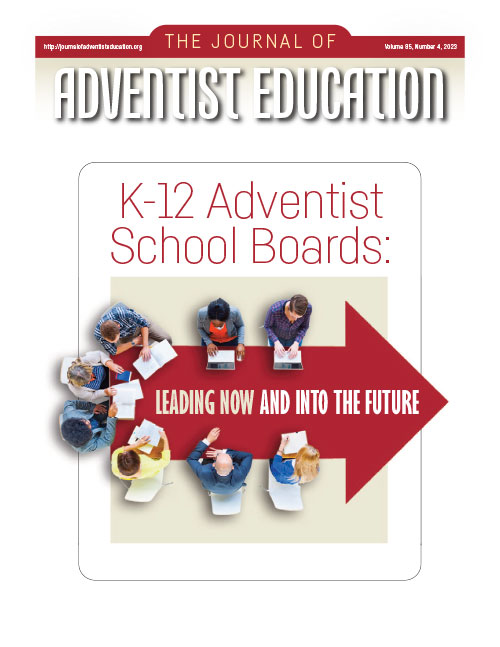In 1 Samuel 4:3, the people of Israel, because of fear and lack of trust, put the Ark of the Covenant in a vulnerable position. They were at war. They were losing the battle. And in that moment, they doubted God’s ability to care for them. Amid their battle, they asked a universal question: “‘Why did the Lord bring defeat on us today before the Philistines?’” (NIV).1 Today, many of us ask the same question: “How could this have happened?” Why did God not protect us from disease, disaster, despair, etc.?
The people of Israel did what we sometimes do—they crafted a plan to solve their problem. While this is not a horrible thing—after all, God created us with the power to think and act—sometimes the outcome is less than desirable. Like the people of Israel, we sometimes decide how we think God should help us. And, instead of anchoring ourselves until the storm passes, preserving what is essential to our survival, we begin charting a course in the middle of the storm. We rush to solve our problems ourselves, resorting to our own devices, sometimes sacrificing what is most valuable to us. We, too, say, “Let us do this/that/or the other. . . .”
Anchor Types
Several years ago, I found an article about the Blue Water Sailing School in Ft. Lauderdale, Florida. Blue Water teaches individuals how to sail 35- to 50-foot vessels.2 It offers lessons in sailing, navigation, and anchoring. In another article on how anchors work,3 I learned that there are several types of anchors, and each works differently—no one anchor is suitable for all situations, and most boats and ships carry more than one type.
For example, lightweight anchors dig into the bottom rather than being held steady by immovable weight. They have flukes (broad triangular plates that look like prongs) that dig into softer surfaces or can be dragged along the bottom to find a crevice on a hard surface. Some anchors that work on soft surfaces are also effective in hard mud or weeds and on rocky surfaces. These anchors have a pivot at the crown of the shank (or the main arm of the anchor) that allows the shank to swing from side to side as the sailing vessel moves in the wind. Decisions about which anchor to use depend on factors such as the composition of the bottom surface, whether soft sand, mud, or rocks. Other considerations include the depth of the body of water, whether a lake, river, or ocean, and the current, tide, and wind direction. Possible obstructions such as debris, fissures in the surface, and sea creatures that live on the bottom surface (e.g., coral reefs, oysters, clams, etc.) also factor into decision-making.4 Interestingly, each type of anchor clings in a different way. Lightweight anchors “dig in” or “find a crevice” to hook themselves. Heavyweight anchors pivot, allowing the vessel to roll with the waves while they dig into the surface.
Similar to how the captain of a vessel decides which anchor to use, throughout our lives, we will need to decide what type of anchor we will need in a given situation. Do we need to cling? Do we need to pivot? Is the surface soft and flexible or rigid and immovable? And, as the old hymn says, “Will our anchor hold in the storms of life, when the clouds unfold their wings of strife? When the strong tides lift, and the cables strain, will your anchor drift, or firm remain?”5
We Need an Anchor That Holds
By 1 Samuel 7:2 to 5, the people of Israel recognized that only God, not their best-laid plans, could deliver them: “Then all the people of Israel turned back to the Lord. . . . the Israelites put away their Baals and Ashtoreths, and served the Lord only.” When Israel realized their need for an anchor, they “dug in.” In verse 5, we read: “Then Samuel said, ‘Assemble all Israel at Mizpah, and I will intercede with the Lord for you.’”6 When they had assembled at Mizpah, they drew water and poured it out before the Lord. They fasted that day and confessed, “‘We have sinned against the Lord’” (vs. 6). With fasting, prayer, and sacrifice, they recommitted, reconsecrated, and anchored themselves in God.
Sometimes, we must “dig in” and anchor ourselves deeply because the storm is bearing down; the waves are tumultuous and tossing us back and forth. The hearts of those around us are hardened or obstructed, making it difficult to remain secure in our convictions. How we anchor in times of trouble is vital because, regardless of the circumstances surrounding us, the anchor must hold.
The good news is that we have an anchor! For the people of Israel, it was the God whose presence inhabited the Ark of the Covenant, a symbol of God's binding agreement with His people and the hope and promise of a Savior. The Ark contained artifacts to remind them of how God had been with them through perilous times: as they fled from Egypt (Aaron’s rod that budded); as they wandered in the desert (manna); and the lid—the Mercy Seat—a tangible, visible reminder of the plan instituted for the forgiveness of their sins, and a promise that one day there would be a Lamb who would wash away the sins of the world forever (2 Samuel 7:10-13; Isaiah 53:1-12).
For us today, it is this same God: “We have this hope as an anchor for the soul, firm and secure” (Hebrews 6:19). We have an anchor that holds. Anchoring does not keep the storm away; it keeps us secure in the storm. Though the storm is unrelenting, we must anchor ourselves in the Rock that is Jesus Christ, for He is our only sure hope.
Relentless Hope
The story continues in 1 Samuel 7:7: “And when the Philistines heard that the children of Israel were gathered together to Mizpah, the lords of the Philistines went up against Israel. And when the children of Israel heard it, they were afraid of the Philistines” (KJV). During the Israelites’ repentance and recommitment to the God of Israel, the Philistines came against them once more. We all know those times—when things can’t seem to get any worse, and then they do! Despite all possible interventions, the situation deteriorates. Yet, Colossians 1:27 reminds us that our hope is the “hope of glory”; we have “a living hope” (1 Peter 1:3).
This time, instead of taking matters into their own hands, the Israelites asked Samuel to continue praying on their behalf (1 Samuel 7:8, 9). He did, and God delivered them (1 Samuel 10 and 11).
What is your “Philistine army”? Those challenges that continue to advance? Those situations that seek to steal your confidence in God? God still keeps His people amid the storm; He still delivers.
We always have a choice if we believe God is leading. Our life’s journey might have storms and rough seas—some stronger than others. Yet, we must press on. We will get weary and tired—yet we must press on. We will see financial, political, religious, and social crises—yet we must press on. We press on because we know that God can transform any situation, and we can be sure that we have nothing to fear for the future except as we forget how God has led us in the past.6
We hope you enjoy the articles in this issue and that they stimulate thinking, foster good practice, and generate hope. Most of all, we encourage you to write for us! Visit our Calls for Manuscripts section (https://www.journalofadventisteducation.org/calls-for-manuscripts) to see our current priorities and our author guidelines (https://www.journalofadventisteducation.org/author-and-reviewer-guidelines) for the various types of articles we accept.
Recommended citation:
Faith-Ann A. McGarrell, “Anchored in a Covenant,” The Journal of Adventist Education 85:4 (2023): 3, 45. https://doi.org/10.55668/jae0052
NOTES AND REFERENCES
- Unless specified otherwise, all Scripture references in this editorial are quoted from the New International Version of the Bible. Holy Bible, New International Version®, NIV® Copyright © 1973, 1978, 1984, 2011 by Biblica, Inc.® Used by permission. All rights reserved worldwide.
- Blue Water Sailing School Courses: https://www.bwss.com/courses/asa-106-advanced-coastal-cruising.html.
- Granada Blue Water Sailing, “The Do’s and Don’ts of Anchoring” (2024): https://www.grenadabluewatersailing.com/anchoring-advice/.
- Ibid.
- Priscilla J. Owens, “We Have an Anchor” Hymnary.org: https://hymnary.org/text/will_your_anchor_hold_in_the_storms_of_l.
- Ellen G. White, Life Sketches of Ellen White (Mountain View, Calif.: Pacific Press, 1915), 196.




